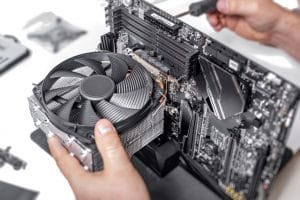 Heat exchangers have a reputation for making electrical thermal management a more efficient process, and they consistently live up to that reputation the more companies utilize them. Even as technology and its thermal management demands have evolved, heat exchangers have continued to provide high-quality cooling and thermal management solutions to match them. The advantages that stem from heat exchangers have helped companies that utilize advanced technologies make the most of their investments. In nearly every industry, heat exchangers help streamline thermal management in increasingly more significant ways.
Heat exchangers have a reputation for making electrical thermal management a more efficient process, and they consistently live up to that reputation the more companies utilize them. Even as technology and its thermal management demands have evolved, heat exchangers have continued to provide high-quality cooling and thermal management solutions to match them. The advantages that stem from heat exchangers have helped companies that utilize advanced technologies make the most of their investments. In nearly every industry, heat exchangers help streamline thermal management in increasingly more significant ways.
They make electrical cooling nearly automated
Electrical thermal management hasn’t always been a field ripe for efficiency. Decades ago, companies in most industries were consigned to relying on solutions such as air conditioners and air compressors, which were effective but costly to run and maintain. At the time, utilizing chilled air to keep electrical enclosures from overheating seemed like the only option. However, HVAC and air compressing equipment often requires frequent maintenance and can be prone to various parts failures. One of the greatest advantages of modern heat exchangers is that the fluid inside of them can continuously absorb and transfer electrical waste in a self-contained loop, making the thermal management process of cooling electrical enclosures virtually automated.
They turn waste heat into purposeful heat
The fact that heat exchangers transfer heat in a loop and are nearly self-sufficient is essential to making electrical cooling processes more efficient. However, beyond helping employees focus on more important tasks and reducing downtime due to maintenance, heat exchangers also help connect electrical cooling with other important thermal management processes in many different industries. In some cases, heat exchangers can be designed to transfer heat and dissipate it, or to transfer it somewhere it can be used for a purpose. For example, companies utilize heat exchangers to lower the energy costs associated with wastewater treatment by supplementing the heat required to treat the water.
They fit into extremely tight spaces
The more technology advances, the more powerful it becomes, and out of necessity, the smaller it becomes. In applications that range from high-performance computing to automated machinery, and more, heat exchangers and their streamlined thermal management processes have been invaluable. In addition to their capacity to manage large amounts of waste heat with optimal efficiency, heat exchangers can also be custom designed to fit into the smallest and most unique of spaces. For more information about the specific ways heat exchangers streamline thermal management, call Noren Thermal Solutions in Taylor, TX, at 866-936-6736.







